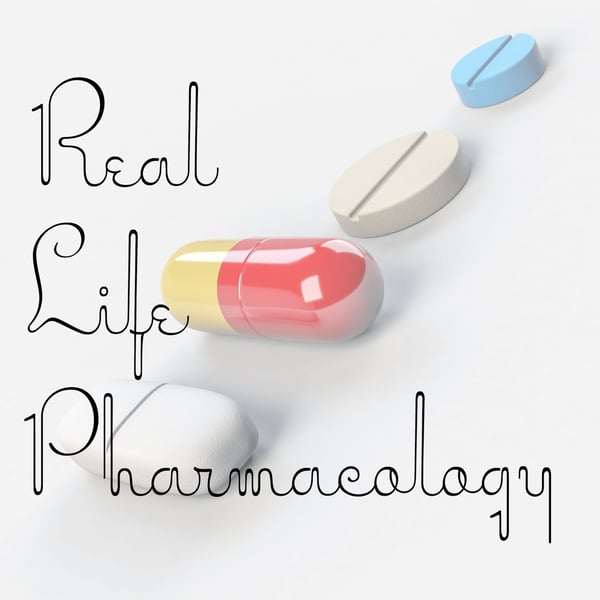Probenecid Pharmacology
Real Life Pharmacology - Pharmacology Education for Health Care Professionals
Eric Christianson, PharmD; Pharmacology Expert and Clinical Pharmacist
5 • 716 Ratings
🗓️ 23 January 2020
⏱️ 12 minutes
🧾️ Download transcript
Summary
In a patient taking probenecid, they need to have adequate kidney function for the drug to work.
GI upset is likely the most common adverse effect of probenecid. It can be given with food.
Probenecid can raise the concentrations of many common antibiotics like penicillins and cephalosporins.
Remember that there are many medications that can oppose the beneficial effects of probenecid. Thiazides, niacin, and some immunosuppressants can raise uric acid.
Transcript
Click on a timestamp to play from that location
| 0:00.0 | Hey all, welcome back to the Real Life Pharmacology podcast. I'm your host, Eric Christensen. |
| 0:05.5 | Thank you so much for listening. I greatly appreciative to all of you who have shared the podcast |
| 0:10.5 | with classmates, students, friends, other healthcare professionals to help grow their knowledge, |
| 0:17.7 | background, and their skill set surrounding the use of medications. |
| 0:22.6 | So please keep sharing. |
| 0:24.7 | If you enjoy the podcast and feel it's relevant and beneficial, I'm greatly appreciative of that. |
| 0:31.5 | So let's get into it today. |
| 0:33.9 | Probenicid is the drug I'm going to talk about. And I approach this drug cautiously. The title of my |
| 0:43.9 | podcast is obviously real-life pharmacology. And I try to bring to you stuff that's used in |
| 0:51.4 | clinical practice. Now, I will say I have seen probenicid used in clinical |
| 0:55.7 | practice. I would say it's maybe five or ten times at most in my experience. Usually it's been |
| 1:04.0 | patients that have been on it for a long time. It's been helpful for them. Or they've had an allergy |
| 1:09.4 | or intolerance to other gout medications. So |
| 1:13.7 | probenicid primarily is going to be used in the setting of preventing gout flares, okay? |
| 1:21.4 | Not the treatment of an active gout flare, but prevention. And it does that by lowering uric acid. |
| 1:29.5 | Euric acid is one of the major components that we worry about in patients with frequent gout |
| 1:35.2 | flares. |
| 1:36.6 | There is one other indication other than gout that I have seen suggested, and that is to increase concentrations of penicillin antibiotics |
| 1:47.0 | to enable them to have better effects, basically, on treating an infection. |
| 1:53.0 | I've never seen this done personally, but I have heard of it before there. |
| 1:58.0 | So just wanted to throw that out there for complete completeness sake. |
| 2:03.6 | All right. So mechanistically, how does this drug block uric acid? So if you remember back and |
... |
Please login to see the full transcript.
Disclaimer: The podcast and artwork embedded on this page are from Eric Christianson, PharmD; Pharmacology Expert and Clinical Pharmacist, and are the property of its owner and not affiliated with or endorsed by Tapesearch.
Generated transcripts are the property of Eric Christianson, PharmD; Pharmacology Expert and Clinical Pharmacist and are distributed freely under the Fair Use doctrine. Transcripts generated by Tapesearch are not guaranteed to be accurate.
Copyright © Tapesearch 2025.

